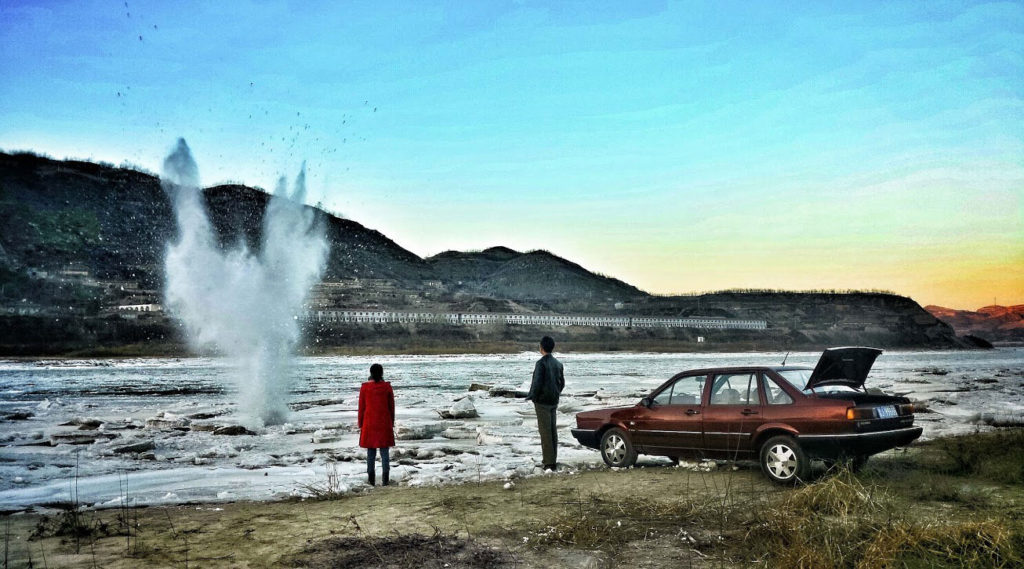May Jia Zhangke’s Glorious Melodrama Never Depart
DIRECTED BY JIA ZHANGKE/CHINESE, MANDARIN, CANTONESE, ENGLISH/2016 (U.S. release)
STREET DATE: July 12, 2016/KINO LORBER
 For the mountains may depart
For the mountains may depart
and the hills be removed,
but my steadfast love shall not depart from you,
and my covenant of peace shall not be removed,”
says the LORD, who has compassion on you.
- Isaiah 54:10, ESV
The spirit of reassurance found in this Old Testament passage proves to be about as elusive in Chinese filmmaker Jia Zhangke’s latest film from which it draws its title, Mountains May Depart, as it is in the lives of so many in real life. Yet, it applies; it might just be the key.
In a film as deeply rooted in unexplained Chinese nationalism as this one is, it’s a brilliant wonder that its core humanity is never inaccessible.
Although an intimate melodrama by classification, Mountains May Depart transcends whatever “kitchen sink” trappings that the prospective viewer may be inclined to associate with the subgenre. The film graces with a musical flow, anchored by a few practical songs that reoccur in the fabric of the characters lives. Most prominent is the infectious “Go West” by the Pet Shop Boys, opening the movie with a joyous dance number.
 Indicative, though, of China’s current unstable cultural milieu, the millennial joyousness experienced upfront (taking place in 1999) cannot last. What starts as a rigid love triangle between an effervescent young woman (played with exceptional presence and range by Zhao Tao), a well-meaning miner (Liang Jin Dong) and a wealthy capitalist (Zhang Yi) – all of whom grew up as friends – refuses to be contained by conventional cinematic parameters. Time periods, spoken languages, aspect ratios and continental settings all shift fluidly yet organically as the story unfolds. It’s reminiscent of The Place Beyond the Pines, but a lot better and effectively Chinese.
Indicative, though, of China’s current unstable cultural milieu, the millennial joyousness experienced upfront (taking place in 1999) cannot last. What starts as a rigid love triangle between an effervescent young woman (played with exceptional presence and range by Zhao Tao), a well-meaning miner (Liang Jin Dong) and a wealthy capitalist (Zhang Yi) – all of whom grew up as friends – refuses to be contained by conventional cinematic parameters. Time periods, spoken languages, aspect ratios and continental settings all shift fluidly yet organically as the story unfolds. It’s reminiscent of The Place Beyond the Pines, but a lot better and effectively Chinese.
Like life, what appears direct, logical and perhaps predictable turns out to be anything but. Which is precisely, ironically, why Mountains May Depart is all the more believable. In a film as deeply rooted in unexplained Chinese nationalism as this one is, it’s a brilliant wonder that its core humanity is never inaccessible. These are often troubled, sometimes confused lives of ordinary, extraordinary people.
Through them, it’s a story of their country – even when the whole setting shifts to an entirely separate continent. Certain choices, so justifiable at the time, prove shattering; national identity is being forgotten. Westerners may not know China any more than they know these characters going in, but Jia has succeeded in communicating the plight through oblique metaphor; it resinates even with outsiders. That is a storytelling triumph, and mountainous filmmaking.
 The downright sumptuous cinematography of the film is one of its greatest accomplishments, so crisply and beautifully presented on this blu-ray. Tao’s red coat pops as it should, even as the mist she wanders in is palpable. The disc is simply a must-get for any collector of great cinema. Even Kino Lorber’s cover and packaging art far surpasses the various theatrical one sheets for the movie.
The downright sumptuous cinematography of the film is one of its greatest accomplishments, so crisply and beautifully presented on this blu-ray. Tao’s red coat pops as it should, even as the mist she wanders in is palpable. The disc is simply a must-get for any collector of great cinema. Even Kino Lorber’s cover and packaging art far surpasses the various theatrical one sheets for the movie.
Although the film’s trailer details the basic triptych of the story, revealing the when, wheres and whos of it all, Mountains May Depart might be ideally approached blindly. Don’t stop reading; any such specific details aren’t found in this review. Simply the question: Is Mountains May Depart the best film of the year? (It’s U.S. theatrical release didn’t come about until 2016.) In its running for such a position, it is steadfast.
Besides the trailer, the new blu-ray release of this film is accompanied by a 73 minute post-film Q&A with the film’s celebrated creator Jia Zhangke, recorded as part of the 53rd Annual New York Film Festival. It’s a very dry if informative watch, as the runtime would be less than half of what it is if an English/Chinese translator weren’t necessary. Jia nonetheless has no trouble talking about his film, as the interviewer is not able to ask many questions.
 The interviewer does, however, get to ask about the title. A long-winded and interesting answer rolls out, eventually acknowledging that although the Chinese title is of greater significance to him, he let his longtime cinematographer Yu Lik-wai come up with the English version, on account of his far greater command of the English language. Being of Biblical origin, concerns of it sounding “too religious” (too western) were tempered by dropping the words “For the”.
The interviewer does, however, get to ask about the title. A long-winded and interesting answer rolls out, eventually acknowledging that although the Chinese title is of greater significance to him, he let his longtime cinematographer Yu Lik-wai come up with the English version, on account of his far greater command of the English language. Being of Biblical origin, concerns of it sounding “too religious” (too western) were tempered by dropping the words “For the”.
Religion may not have been Jia’s aspiration, but he’s certainly achieved something spiritual. Spiritual in a filmic and universal sense. Even as the film mourns westernization via mounting gloom, fog and things left unspoken, the song “Go West” is there, a buoyant reminder that even in this, all cannot be lost. As western culture appropriates the Chinese way of life, the appropriation history of the Pet Shop Boys 1993 ear-worm from a hokey old Village People song proves all the more curious.
Is “Mountains May Depart” the best film of the year? In its running for such a position, it is steadfast.
More curious still is the undeniable musical similarity between “Go West” and a Christian praise song called “Give Thanks” (not part of the film). The original version as well as the most popular recorded version of that song eerily mirror those of the former, secular song. Both songs stem from the very late 1970s, one initially as gay as all get out and the other as church-bound as could be, hit recorded popularity via cover artists (“Go West” by The Pet Shop Boys and “Give Thanks” by a singer/songwriter pastor Don Moen) in the late 1980s/early 1990s. Did one rip off or infect the other? Which came first? Does it matter? Their lyrical commonality may be zilch, but musically (the true soul of a song), they might be twins, separated at birth and relegated to differing spheres. East and West, very separate yet not so different.
All are loved, and compassion awaits. That is reassurance. It’s up to us to make the connections.
The images in this review are not representative of the actual Blu-ray’s image quality, and are included only to represent the film itself.

